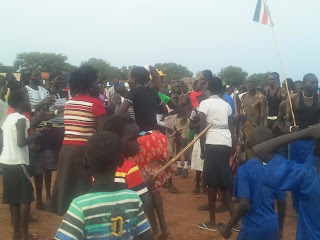One year ago
when I was living on a beautiful Australian beach, before going to South Sudan
even crossed my mind, I had a random conversation with a man about my future
plans; I told him that I see myself working in development and he got really
upset, telling me that ‘charity starts at home’, that there are many people in
Australia that need help. While I didn't disagree with this statement, I tried
to explain to him that there is no poverty in Australia, being poor in a first world
country will often mean that you can’t afford an Iphone. I might
be amplifying, but being poor in a Western country is hardly comparable to
the extreme vulnerability of a poor person in Africa. In Australia everyone has
a roof on top of his head and access to health services and basic education. So how can you
compare it with the billion (!) people in the world that don’t have access to
clean water?
With half of
South Sudan’s population below poverty line, the quality of life in the country
is extremely gloomy. The country has the highest maternal mortality rate
in the world. It ranks fourth in global deaths from malaria and suffers some of
the world’s highest child death rates. It is not a surprise when 60% of the
population has no access to health care. The situation in education is equally
grim. Around 1 million children, half of the primary school age population, are
out of school. Moreover, not even half of the population has access to
clean water supply, and around 7% have sanitation.
In the last 3
month these dry statistics became people’s faces, it became the face of a blind
old lady in the market and the face of street boy eating a rotten watermelon.
There are
many reasons to why those countries are in the situations that they are in, and
different people have different explanation. Paul Collier points out the
different traps of the developing world such as a land locked country, a long
conflict, natural resources and bad governance. Come to think about it, the
case of South Sudan to verify his point. I also find Thomas Pogge’s view
interesting; claiming that poverty is a violation of human rights because it is
caused by the west, forcing us to take responsibility. He said: “We call
it tragic that the basic human rights of so many remain unfulfilled and are
willing to admit that we should do more to help. But it is unthinkable to us
that we are actively responsible for the catastrophe.” Colonisation, domination
by the west and discriminating international opportunities put some in a worse
off position.
I thought
that coming here will give me some answers about why the situation is like it is
and maybe on what we can do. But 3 month on I don’t have any answers; in fact,
I have even more questions. Poverty, just like its derivatives and causes are
complex issues, shaped by limitless factors; from a person’s own perception, to
culture, to history, to geography, to national leadership and international
agenda.Being here
made me realize though, that in realty causes, reasons and explanations are
meaningless and what really matters is what being vulnerable really means to
people life.




































